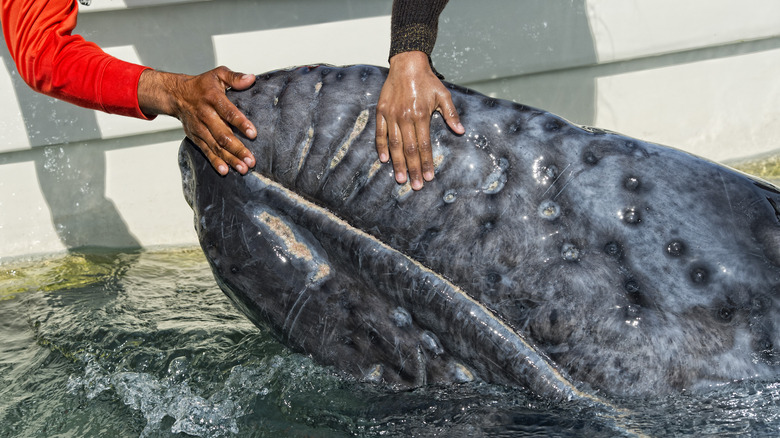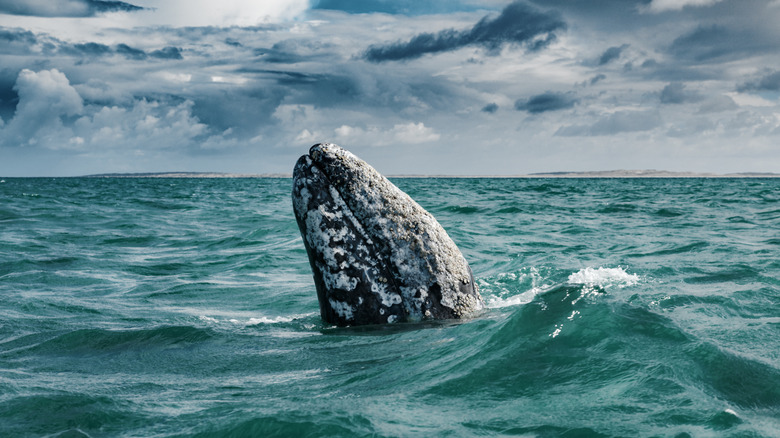Melanie Carden
Before we get to the giant, kind-eyed whales, let’s clear up some confusion. First, Baja California is not a state in the United States. Instead, it’s a state in Mexico, nestled along the country’s Pacific coast peninsula, and it attaches to land between San Diego, California, and Tijuana, Mexico. But “baja” translates to English to mean “lower,” so the Mexican state is aptly named, of course, based on its location to the south of the United States’ California.
But gray whales don’t give a hoot about tourists’ navigational woes because they’re on a mission. The World Wide Fund for Nature notes that the whales’ annual winter migration from the Bering Sea in Alaska to the waters of this Mexican peninsula — a 6,000-mile journey — is the longest of any mammal migration. And cooler still, seafaring adventurers can get close to these inquisitive creatures, known for their gentle interactions with humans. So, set aside tales about being swallowed by a whale, these giants are as gentle as they come.
Is it ethical to touch the whales in Baja?

Andrea Izzotti/Shutterstock
So, what’s so great about Mexico’s Baja California to inspire the gray whales to leave Alaska and swim night and day to reach the waters of its peninsula? The folks at Sea Kayak Adventures explain to would-be adventurers that the waters there are calm and nutrient-dense, and the three major Baja lagoons, San Ignacio, Scammon’s Lagoon, and Magdalena Bay, provide seclusion and protection for newborns.
In addition to the sheer number of whales during this winter migration, whale watching here boasts a rare benefit — extreme proximity. Among the scroll-like list of reasons contributing to this departure from typical wildlife behavior, the gray whales here often initiate contact with humans, as reported by National Geographic. But, as Bloomberg writer Sara Clemence explores, is it ethical to touch the whales?
One of the tenets of wildlife tourism has always been a hands-off philosophy, but here, most experts, such as Steven Swartz, Ph.D., say it’s a little different in these waters. He explained to Bloomberg that it’s safe for the whales because they’re initiating the contact and there are mandatory guidelines, such as no feeding. “They love to rub and touch,” he explains. “That’s how they communicate.”
Consider this when selecting an excursion

Mikelaptev/Getty Images
Due to the calendar regularity with which gray whales migrate from Alaska to Mexico for breeding and birthing, there’s no shortage of gray whale watching adventures in Baja, Mexico. But although there’s whale watching year-round, January through March is the height of the season, which is why excursion companies such as Responsible Travel schedule adventures for the winter months.
Taking a cue from Responsible Travel’s approach to the ethics of wildlife tourism, look for a company that prioritizes the whales’ wellbeing. As part of their stance on responsible tourism, the adventure travel company references Dylan Walker, CEO of World Cetacean Alliance, who says, “The interaction, if and when it takes place, is completely on the terms of the animals.” So, look for an excursion that explicitly states that the boats will go to known whale siting locations in Baja and wait for the whales instead of following or chasing them, which is stressful to the animals.
A bonus (as if proximity to gray whales isn’t enough), The Culture Trip quickly reminds folks that the area is also known for its blue, sperm, fin, minke, orcas, short-finned pilot, and humpback whales as well. So, skip the YouTube adventure movies, and experience it for yourself. Grab some marine-friendly sunblock and set sail for the adventure of a lifetime.

